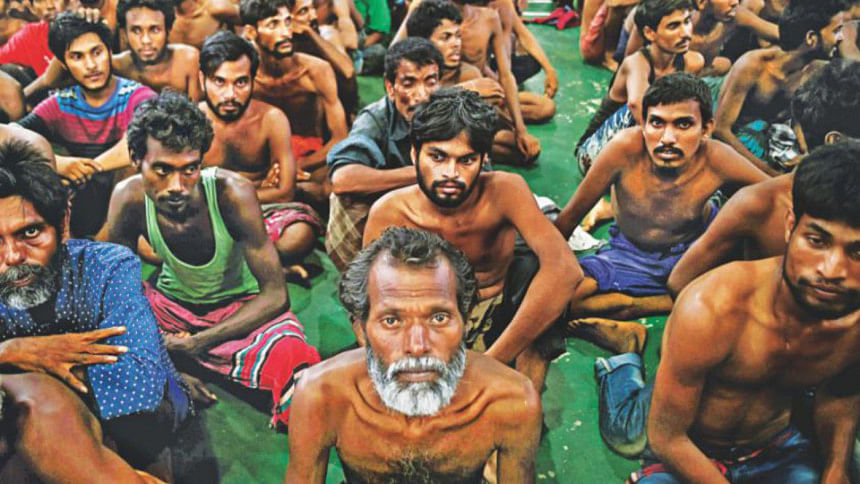Free/r movement of human capital is a necessity

THEY are not thieves, robbers or pirates but desperate jobseekers ready to give service in exchange for something to live on. They have a right to livelihood in this wide world we call Mother Earth. The appellation of the 'earth mothering' us is perhaps no longer cited as affectionately as before by the abandoned.
We have been jarred by screaming headlines like mass graves of ill-fated jobseekers dug out and duly buried and shivering rickety fugitives recovered in deep jungles, many of them Bangladeshis. The other headlines were '555 Bangladeshis among rescued boat people', 'Bangladesh migrants adrift at sea for 36 hours', '54 days of torture and starvation at sea'.
The concern reflected on the subtexts reading 'Myanmar, Thailand and Malaysia turning away boat people' with a common note of urging for a regional summit to address the issue head on. Let the urgency not slip out through the outpourings of palliative rhetoric creating a false sense of something being done about it after all.
Some European littoral states of Mediterranean Sea, considered favourite destinations by fortune-seekers, were also turning away the incoming trawlers or boats brimming with men, women and children, not even left with their last ounce of energy. As if some pariahs are floating close to their sacrosanct shores.
Our front page serial on slave trade creating a stir, the ANN network picked up from it and disseminated the shocking and region-wide relevant accounts of abandoned jobseekers, dead or alive.
Now is the right time to implore the world at large to find a sustainable solution to illegal migration which far outstrips legal migration. Whipped by poverty and hunger in jobless circumstances, people become so gullible that even a dangerous misadventure has a tantalising romantic aura about it. This is fully exploited by the cross border rackets. Governments' agencies have known this but allowed themselves to be outsmarted in the long coastlines topped up by palm-greasing.
But are they to be solely blamed? The great walls raised by the recipient countries by brisling fences along their borders and flotilla of ships keeping at bay migrants from reaching their shores are, as it were, costing their eyes out of their heads. They incur huge expenditure in maintaining such flogging devices and the infrastructure to ward off the intrusion of what they term illegal migrants. They find it hard to discriminate between fishing boats and migrant carrying trawlers like they see in such attempted migration a whiff of imported extremism. Little do they realise that by a perpetuation of poverty in which they are being unwitting abettors they may well be actually nurturing militancy.
You add up the UNHCR costs for rehabilitation of the refugees and the various aid giving largesse, and you have the full picture of the debit side. So we ask for a cost benefit ratio to be drawn between relaxing restrictions on migrations and the benefits of harnessing the human capital of the populous countries in those with limited population or a negative growth in the populace.
The migration is the function of demand and supply as assessed by countries at a given point in time. They have to make projections for the future and accommodate the surplus labour from developing countries. It can all be choreographed with collective wisdom and knowledge to meet each other's development goals with a human face.
The world goes head over heels over free movement of financial capital but when it comes to free movement of human capital it sulks, cringes as if a physical invasion is in the offing.
We no longer get to hear about the need for a convention on free movement of human capital/labour which as far as one can remember had been put on the table nearly a decade ago but never figuring in rights discourses all these years. This is a great pity and amounts to gross negligence of an agenda that even has not been reincarnated in the face of pressing circumstances surrounding the issue of migration of virtual economic refugees. This need is even further reinforced by the challenges of climate change staring in the face of humanity with none of the countries being excluded from the onrushing phenomenon.
This is in spite of a general human rights instrument embodied in the Universal Declaration of Human Rights 1948. 'This instrument provides that everyone has a right to a standard of living adequate for health and well-being of himself and his family, including: food, clothing, housing and medical care and necessary social services and the right to security in the event of unemployment, sickness, disability, widowhood, old age or other lack of livelihood in circumstances beyond his control.'
Were these words meant to be frozen in cold print and not lived up to?
The writer is Associate Editor, The Daily Star.

 For all latest news, follow The Daily Star's Google News channel.
For all latest news, follow The Daily Star's Google News channel. 



Comments